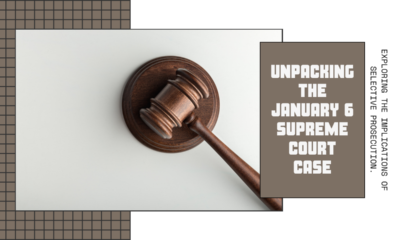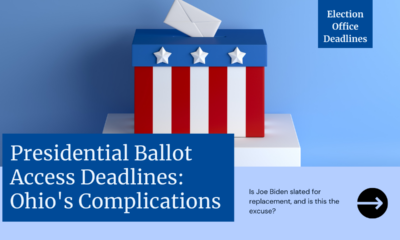Executive
Election reform: durational residence

Today CNAV begins a new series on election reform. But by “election reform” CNAV does not mean what Social Justice Warriors want. They want the eventual abolition of elections with themselves as the oligarchy. To that end they gimmick elections so that they always win. (Though in the Election of 2020 they made a mistake! They neglected the down-ticket races.) To a conservative, election reform means securing the integrity of our elections against all manner of fraud. To do that, authorities must make such fraud impossible. And one of the best ways authorities can do that, if they really want to, is to reinstate durational residence.
What is durational residence?
Durational residence means a minimum period you must live in a State, before you may register to vote. Traditionally this period lasted six months. First you established residency, by buying a house or renting an apartment. (You did not establish residency by living in a college dorm, frat house, hotel, etc.) Then you lived there for six months. Then they would let you register to vote.
Durational residence does two things for a community that asks it of newcomers. First it demands that those who take a hand in electing people, have a vested interest in the community. One demonstrates that by living in the community long-term. Second, it allows election authorities to validate each person registering to vote. Divisions and clerks of elections have an obligation to ensure that each and every voter:
- Is a living, breathing person,
- Having a vested interest in the community,
- And also the State and the country in which he or she lives.
Had the residents of a town called Antelope, Oregon had a durational residence requirement, a certain “guru” named Bhagwan Shree Rajneesh would never have been able to import large numbers of his followers to that town, who then proceeded to:
- Register to vote, and
- Change the very name of the town to “Rajneeshpuram.”
The only way the Antelopers got their town back is that the Internal Revenue Service chased Shree Rajneesh away. When Rajneesh left, his followers scattered. The Antelopers retook and renamed their town.
How did the Supreme Court invalidate durational residence?
But in 1972 the Supreme Court changed all that. In Dunn v. Blumstein, the Court, by a vote of six to one with two recusals, held:
The durational residence requirements are violative of the Equal Protection Clause of the Fourteenth Amendment, as they are not necessary to further a compelling state interest.Dunn v. Blumstein, 405 U.S. 330 (1972)
The “Dunn” was Winfield C. Dunn, Governor of Tennessee. Tennessee required residency in the State for one year and in a county for three months. Your editor and his family moved to Tennessee in May of 1969. The durational residence requirement did not hamper my parents’ right to vote in the least. (Tennessee is not an off-year State, only two of which exist: New Jersey and Virginia.) Nor did my parents feel that they had lost any “right to travel.”
The Justices in the majority were:
- Thurgood Marshall (writing for the majority),
- William O. Douglas,
- Walter Brennan,
- Potter Stewart,
- Byron White, and
- Harry Blackmun, writing a concurring opinion.
Warren Burger, the Chief Justice, dissented. More on that later.
What Congress did
Nor did the Supreme Court act alone. Congress, two years earlier, passed Public Law 89-110. They included an addition to the United States Code abolishing durational residence for Presidential primary and general elections. Title 52, United States Code, Section 10502, so provides.
The Congressional Findings have several logical flaws and write many things into the Constitution that don’t exist. According to the Findings, a durational residence requirement, and the “lack of sufficient opportunities for absentee registration and absentee balloting,” denies or abridges:
- The inherent right of citizens of the United States to vote in elections of President and Vice-President or Presidential Electors,
- Rights of interstate travel, and
- Privileges and immunities of citizens of the United States, per Article IV Section 2 Clause 1.
What are the privileges and immunities of citizens in all States? The Constitution itself does not say. It says only,
The Citizens of each State shall be entitled to all Privileges and Immunities of Citizens in the several States.Constitution of the United States, Article IV Section 2 Clause 1
The 91st Congress seems to have thought that no State may require anything even one other State declined to require. That would be an impossible standard, and would mean that all States must stick to a uniform requirement model. And who would propose that model? Congress. This is to turn the States into mere provinces, not sovereign entities.
What inherent right to vote for President?
CNAV finds nothing in the Constitution that grants to citizens of the United States any inherent right to vote for a Presidential candidate or Presidential Elector candidate. It says only that States appoint Presidential Electors “in such manner as the legislature thereof may direct.” (And that the Capital District shall appoint electors “in such manner as Congress may direct.”) The Electors elect the President and Vice-President, presently as per the Twelfth Amendment. (Article II Section 1 Clause 2 states who may not be a Presidential Elector, including without limitation sitting legislators.)
The closest thing to any definition of any right to vote in primaries and general elections of President, Vice-President, and Presidential Electors, is the Twenty-fourth Amendment. That Amendment says that neither the United States nor any State may revoke the right to vote in Federal elections by reason of:
- Failure to pay a poll tax, or
- Nonpayment of any other tax(es).
That still does not vest in any citizen an inherent right to vote for a President or a Presidential “ticket.” A State legislature could appoint a slate of Presidential Electors by a direct legislative act, if it so chose! Congress could do the same for Electors from the District of Columbia. No “inherent right to vote for a President” derives from these rules.
Durational residence does not hinder the right to travel
We turn now to the question of a right to travel – and not merely to travel but to change residence. Now if any State wants to hinder someone’s right to establish residence, they may do so by forbidding newcomers to buy real estate in their State for a period. And if any State wants to hinder someone’s right to move out, then they impose an exit tax. Why, look! New Jersey almost imposed one! They proposed imposing a closing fee, which they would waive if the seller bought a house elsewhere in the State!
(Note: that proposal went nowhere. Furthermore, CNAV does not contemplate a part-year-resident income-tax return, or the requirement that a seller pre-pay the income tax that would be due on the “capital gain” on the home.)
Of course, if a State really wanted to hinder anyone’ right to travel, they would set up roadblocks, checkpoints, and an entry and exit visa system. That would be unconstitutional on its face. The point is: a durational residence requirement does nothing of the kind. You may still move into a State, however temporarily. But you must show a clear intent to be part of that State’s community before they would let you vote.
Is six months or a year really that long to wait?
Tennessee had one of the longer durational residence requirements: one year in the State and three months in a county. With rare exception, no one waiting to establish durational residence need miss a single election. New Jersey and Virginia have elections every year. But the rest of the several States do not. They hold elections every two years. So if someone picks the right time to move, they can have their durational residence in before the next election in which they would take part anyway.
But employees of large businesses can’t always choose their moving time, can they? All right, then! Must long-time residents of a State sacrifice voter integrity to accommodate large employers who transfer people in and out? If anyone feels that he might lose his “right to vote” by being liable for instant transfer, let him negotiate that with his employer. Or let him weigh the transfer liability as a hazard of his employment. One who works for a company that never transfers its people, need never worry, need he?
The college student problem
The spectacle of undergraduate college students, most of whom are inherently temporary residents of the State where the college stands, voting in that State’s election, never used to be a problem. Before the Nixon administration, nearly every State in the union set an Age of Majority and Adult Privilege of 21. When you reached 21 years of age, you could then register to vote, and purchase, imbibe, or transport alcoholic beverages. (Or buy cigarettes. CNAV is sure every Baby Boomer remembers this sticker on cigarette vending machines.)
Sales of cigarettes to MINORS are FORBIDDEN by law. We support this law. Parents are urged to help prevent violations.The Management
But the Twenty-sixth Amendment lowered the voting age nationwide to 18. Ironically, many States still impose the age of 21 as the age of adult beverage or especially handgun privilege. (The Age of Racy Movie Privilege is 17, according tot he Motion Picture Association of America.)
So now, college students could vote while in college. College seniors always could, and perhaps by then, college had taught them some responsibility. Besides, those seniors had only one year of residence before they would take their first business job or go to graduate or professional school.
Today nearly everyone who goes to college is a voting citizen. And they typically register to vote in their college States, not their home States. This should not be. They are not permanent parts of a State’s community. Therefore they should not vote in that State.
What we can do about it
Today two things stand in the way of States reinstating their durational residence requirements for voter registration. They are the case of Dunn v. Blumstein and Title 52 U.S.C. Section 10502.
Neither presents an insurmountable obstacle. First, every last Supreme Court Justice who had any part in the Dunn case is now deceased. The Court has a new composition, of Justices more in tune with the Constitution. So they could reverse this error as easily as the Warren Court reversed the error of Plessy v. Ferguson.
And as for Title 52, United States Code, Section 10502? Repeal it. The Congressional Findings are invalid anyway, as the above analysis has shown.
In addition, CNAV recommends these other relevant reforms:
- Repeal the Twenty-sixth Amendment and substitute an amendment setting the maximum voting age at 21. The Fourteenth Amendment, Section 3, sets the precedent for a voting age of 21.
- Add an amendment, if necessary, to the effect that:
- Congress shall not have the power to interfere with durational residence requirements in any State, and
- The judicial power of the United States shall not extend to questions of how any given State sets qualifications for “electors” in that State.
- Recognize that college students, unless they and their primary bill payers or student-loan guarantors have domicile off-campus but in town, are not residents of their college State or town for voting purposes. (A flat-out scholarship grant would not disqualify a college student who otherwise lived on his own as a “year-rounder.”)
Further implications of domestic residence
This reform addresses the “migration out of Blue States” problem to which Pedro Gonzalez and Rep. Marjorie Taylor Greene (R-Ga.) referred in their respective discussion of a “national divorce.” Mr. Gonzalez proposed what he avowed would be discrimination. The Constitution forbids such discrimination. But a rule that applies to everyone, the Constitution does not forbid.
True, Mr. Gonzalez never defined the “period” during which one ought to wait to vote in a new State of residence.
He probably would have a State impose a two-year requirement to meet durational residence for voting. That would force someone to sit out one election, or one each State and federal election in off-year States. Does that really make one shudder? It might prevent the upending of a new State’s politics by people migrating to that State on orders from a big bankroller. Which is what George Soros actively encouraged people to do in November of 2020.
As it happened, Soros gimmicked the Georgia Senate Runoffs in another way, so two Democrats won without this. But a reasonable durational residence requirement would prevent any such campaign.
Terry A. Hurlbut has been a student of politics, philosophy, and science for more than 35 years. He is a graduate of Yale College and has served as a physician-level laboratory administrator in a 250-bed community hospital. He also is a serious student of the Bible, is conversant in its two primary original languages, and has followed the creation-science movement closely since 1993.
-

 Executive2 days ago
Executive2 days agoJanuary 6 case comes down to selective prosecution
-

 Executive23 hours ago
Executive23 hours agoBiden ballot woes continue
-

 News2 days ago
News2 days agoRolling the Dice on Republicans: Has the Right Become Delusional?
-

 Executive1 day ago
Executive1 day agoWhy Fatal Police Shootings Aren’t Declining: Some Uncomfortable Facts
-

 Civilization1 day ago
Civilization1 day agoPresident Biden Must Not Encourage Illegal Mass Migration From Haiti
-

 Guest Columns1 day ago
Guest Columns1 day agoWhat Was Won in No Labels’ Crusade
-

 Constitution1 day ago
Constitution1 day agoEquality Under the Law and Conflicts of Interest in New York
-

 Civilization2 days ago
Civilization2 days agoBiology, the Supreme Court, and truth






